#Book of Ecclesiastes
Text

Approaching God with Awe
Do not be quick to speak, and do not be hasty in your heart to utter a word before God. After all, God is in heaven and you are on earth. So let your words be few.
— Ecclesiastes 5:2 | Berean Standard Bible (BSB)
Berean Standard Bible (BSB) © 2016, 2020 by Bible Hub and Berean.Bible. All rights Reserved.
Cross References: Matthew 6:7; Proverbs 10:19; Proverbs 20:25
#God#heaven#heart#earth#humility#Ecclesiastes 5:2#Book of Ecclesiastes#Old Testament#BSB#Berean Standard Bible#Bible Hub#Berean Bible
7 notes
·
View notes
Text
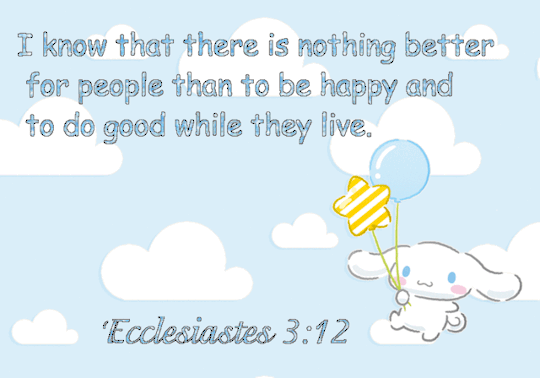
~mod L
Always seek healthy comfort and spread kindness <3
#book of Ecclesiastes#bible verses#glitter edit#glitter gif#glitter text#blue#sky#positivity#cinnamoroll#mod L#christianity#christlikeness#ours
27 notes
·
View notes
Text
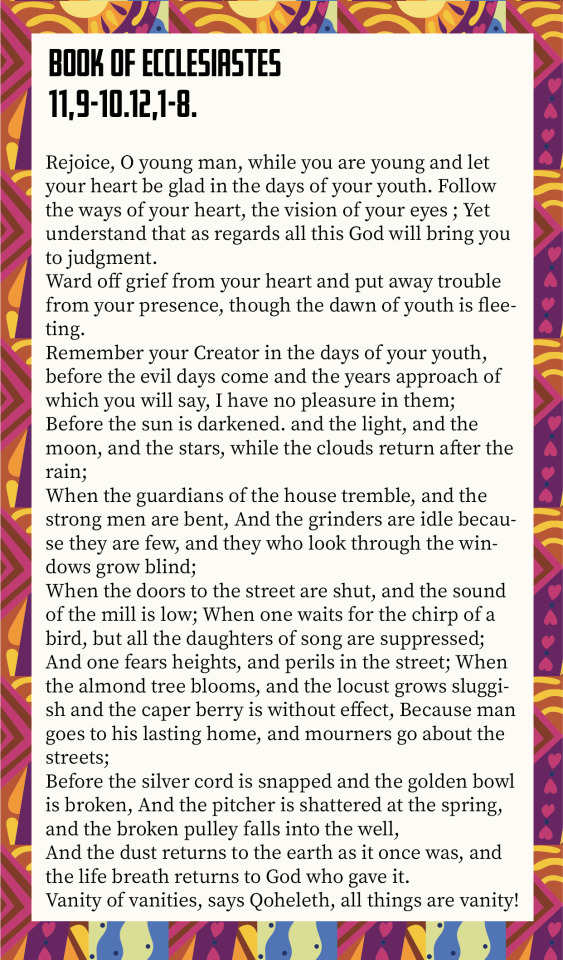

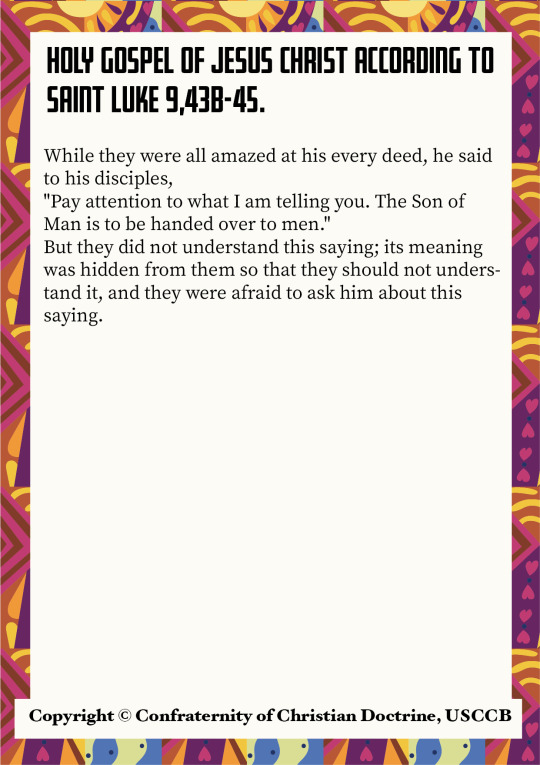
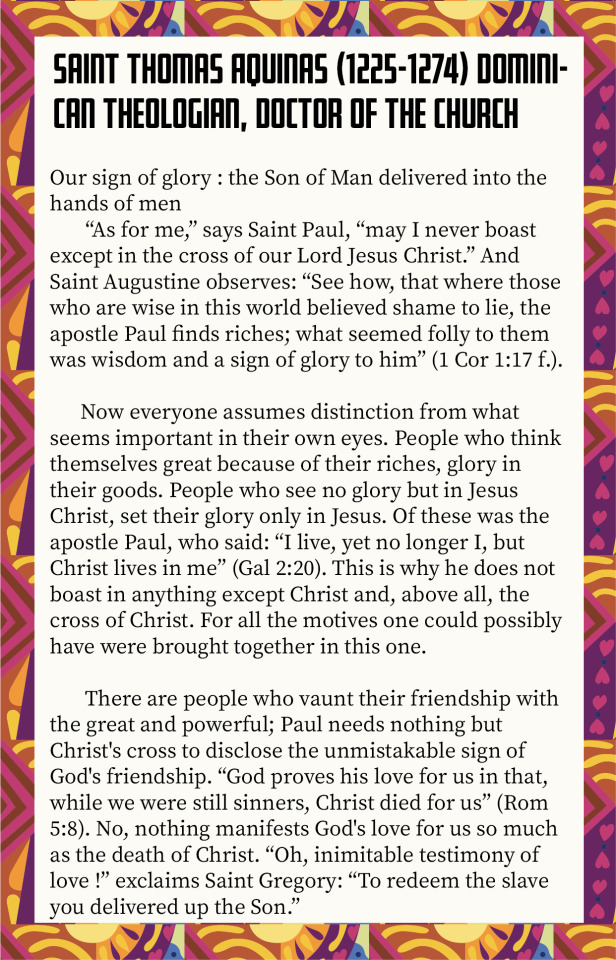
Readings for 24 September
24/09/2022
#Book of Ecclesiastes 11#Book of Ecclesiastes#Psalms 90(89)#Psalms#Holy Gospel of Jesus Christ according to Saint Luke 9#Holy Gospel of Jesus Christ according to Saint Luke#Saint Thomas Aquinas (1225-1274)#Our sign of glory : the Son of Man delivered into the hands of men#God#Lord#Jesus#Holy Spirit#love#hope#heaven#life#peace
2 notes
·
View notes
Text
I am become The Book of Ecclesiastes, destroyer of worlds.
0 notes
Text
If your feeling like there is no purpose to anything and need someone to relate to, reading Ecclesiastes makes sense, Solomon was spitting.
0 notes
Text
It is to Weep…
I thought I had said all I had to say in this space, but a holiday trip I have just completed, and other concurrent experiences, provided me with energy for what I offer below.
The first experience was to find a book in the Copenhagen central railway station, Babel, or the Necessity of Violence, by R.F. Kuang.
It is a complex book, a fantasy involving the magic of translated words placed in…

View On WordPress
0 notes
Text
21/66 Headpiece to Ecclesiastes by Harry Brockway
21/66 Headpiece to Ecclesiastes by Harry Brockway
Wood engraving by Harry Brockway (British b. 1958) in The Reader’s Digest Bible (illustrated edition) 1990
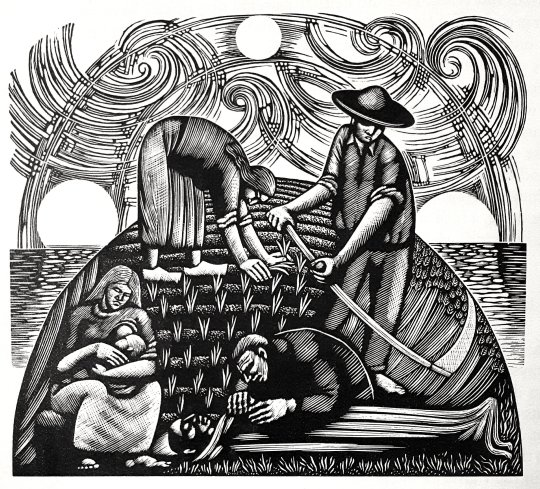
View On WordPress
#Bible#Bible illustration#Book of Ecclesiastes#Ecclesiastes#Harry Brockway#headpiece#life cycle#Phillip Medhurst#Readers Digest#sage#times and seasons#vanity#vignette#Wisdom#wood engraving
1 note
·
View note
Text

From the book of Ecclesiastes by Konstantin Kalynovych
652 notes
·
View notes
Text
two questions to ask yourself when you start looking for pre-christian material in medieval literature:
1. when are these texts from
2. when did christianity come to this area
i can guarantee you in the vast majority of celtic-language sources (and others) the answer to 2. is several centuries before 1. and at that point you gotta ask yourself... how likely is it that these people would be writing about something that has not been a thing for them or anyone they know for, like, four hundred years (or, in many cases, eight or nine hundred years), especially given that most of the people doing that writing are not merely passively existing in a christian society but are, yunno, monks
there are exceptions! but there are way fewer exceptions than you think there are gonna be! and the exceptions are almost always extremely nebulous sub layers that can't be disentangled from the other layers (which are christian) with any certainty so are always somewhat speculative!
and most importantly those other layers are interesting too, but if you only ever treat them like dirt to dig through to get to something "real" underneath you're sure gonna be disappointed a lot of the time (and you're gonna miss a lot of cool shit that would be really exciting if this was an actual archaeological dig and not a metaphor)!!
#this feels a bit like lobbing a grenade into a crowded theatre#but tbh everyone who is mad at me for saying this has probably already blocked me#given that I've been saying it for several years at this point#i think these days people are so used to religion being a personal thing#they don't really comprehend what it meant to Live In A Christian Society As A Medieval Person#like. we're not talking primarily about faith or what someone personally believed#but how society is structured and ordered and the paradigms its literature lives within#AND WHO PRODUCES THE LITERATURE#education is ecclesiastical. book production is ecclesiastical. literacy itself is in many cases ecclesiastical#the christianity is coming from inside the house#anyway whatever why am i trying#i had two (2) entire sips of wine this evening (i don't drink and don't like wine)#so maybe that's why i'm posting this lol
126 notes
·
View notes
Text

Ah, now here’s one I’ve been looking forward to discussing. Lord of the Rings has a strange relationship with hope. Before I began this read-through, I would have told you that hope is at the core of LotR: hope that the war will end, hope that light will triumph over darkness, hope that “there’s some good in this world, Mister Frodo, and it’s worth fighting for”. I would have told you that it’s an innately cheerful, optimistic story, though it gets dark at times.
But over this past year, as I’ve reread this book with the eyes of an adult, I’ve begun to realize it’s more complicated than that.
Lord of the Rings is not a story about hope. It’s a story about what you do without hope. It’s a story about when your spirit is utterly defeated, and your prospects are grim, and both the best and the worst possible outcomes look shockingly alike, and yet you keep walking anyway. It’s not a story of blind, naive optimism, of sitting back and dreaming about a better about-to-be. It’s a story of weighing the facts with a clear mind, of realizing that there’s no way in hell this works out well for you, and of doggedly moving your grain of sand to tip those massive scales anyway, because the only other option would be to sit back and let the world burn.
I feel like that rings truer to the human condition, really. After all, what good is it in the end to be kind and generous and courageous; what good is it to waste our short lives trying to make this awful world a better place? For every one human being trying to be a good person, there are hundreds more who are selfish, cruel, exploitative, greedy, twisted, and wicked. For every good deed done on this planet, there are hundreds more murders and abuses and horrors. One day, you will die, and at some point, everyone who knew you will be dead. There will come a day when you will be utterly forgotten. No one will remember you. No one will remember what you did. No one will remember if you made a difference, if you tried to make the world a better place. And let’s be honest; you won’t. No matter what light you managed to throw into the world while you were alive, this awful cosmos will generate enough pain and misery to overshadow it, eventually. When you’re gone, the world will be just as bad as it always was. Always has been. Always will be.
What good is it to go on loving someone when the diagnosis is terminal—when the medicine doesn’t work—when the sickness in their head has locked the person you love behind an unbreakable concrete wall? What good is it to stand for what you believe in when it’s not popular anymore—when friends and family turn their backs and reject you—when those who gave you praise and encouragement now insult you and curse you and spit on your face? What good is it to love when your heart is broken, be kind when your skin is mottled with bruises, be brave when your back is bent and your arms are weary under the weight of it all? What good is it to cast your little candle light when all the wind in the world tries to blow it out? Why be good? Why be selfless? Why sacrifice so much, when you lose so much more than you gain?
In that moment, there’s only one answer. And it’s not hope. It’s not optimism. It’s some strange defiance, some visceral fire that roars in the chest and aches in the bones.
“I will be light,” it cries. “I will defy you,” it howls. “I will push back with the last of my strength, though you crush me down,” it screams. “Because if I am not light, I am darkness, and I cannot, I will not, I refuse; let me die with my knees unbowed and my head held high; I WILL NEVER SURRENDER”
There are many instances in the book that speak to this point—Aragorn himself says something along the lines of “we must do without hope for the moment”—but to me, nothing better encapsulates this strange spirit of hopeless defiance than this moment with Sam Gamgee.
“Sam said nothing. The look on Frodo’s face was enough for him; he knew that words of his were useless. And after all he never had any real hope in the affair from the beginning; but being a cheerful hobbit he had not needed hope, as long as despair could be postponed. Now they were come to the bitter end. But he had stuck to his master all the way; that was what he had chiefly come for, and he would still stick to him. His master would not go to Mordor alone. Sam would go with him.”
Sam would go with him. Not “we will win”. Not “I believe in us”. Just “he will go, and I will go with him, whether this ends in (improbable) victory or (more probable) a horrible, horrible death”. It’s not that Sam’s hope began to fail here; it’s that he never had much hope to begin with, but he went with it anyway, and it’s only his cheerful disposition in the face of near certain disaster that ever began to flag. Holy cow.
Now these three remain: faith, hope, and love; but when the first two fail, love is the unkillable cockroach of all the virtues and will survive the nuclear winter of utter despair and grow wings and fly buzzing right up into your face just to spite you.
Now, of course Lord of the Rings does not simply leave us with the tragedy of a futile fight against the darkness. This story has a happy ending. And I’m glad it does, because sometimes, there are happy endings. Sometimes sicknesses are cured, families are restored, and old scars are healed and begin to fade. Sometimes loved ones emerge from the prison of their own minds and return to you—wiser, more melancholy, but still themselves—and you discover that the bond is deeper, the smiles sweeter, the laughter richer, and the love galvanized into something stronger than it ever would have been. Sometimes there are happy endings, and it’s not wrong to want them. It’s not wrong to have hope.
But Lord of the Rings lets us linger in that moment of hopeless defiance, because it offers an odd sort of comfort of a totally different kind.
“Lost all hope, did you?” it whispers. “It’s all right. So did Frodo, and Aragorn, and Gandalf, and Sam. But you see, they kept fighting anyway, with hope or without it, and that’s what made them heroes. Oh, you might still have your happy ending, someday, and it might come in ways you don’t expect. It is also equally likely that nothing will get better, and it will actually get much worse, and you shall die. But do keep fighting. Do keep walking. One foot in front of the other. If you do nothing, the worst will definitely come to pass; but if you fight, it just might not. So if we shall win, let’s not be embarrassed by our cowardice when that happy ending comes; and if we shall lose, let’s not go down without a fight.”
Perhaps, paradoxically, that’s what makes Lord of the Rings the most hopeful story of all. Because this is the story that whispers, “Remember, when all hope is gone…
“It isn’t.”
WORD ASK GAME!
#word ask game#samwise gamgee#lord of the rings#lotr#my writing#oops an essay#if any part of this starts to sound like i read ecclesiastes recently……that’s because i did#what a wonderful book. makes me feel like there’s room enough in my faith for pessimism and existential dread.#which is great because i’m naturally full of both of those things LOL
296 notes
·
View notes
Text
"What has been will be again, what has been done will be done again; there is nothing new under the sun."
— Ecclesiastes 1:9 (NIV)
#bible verse#scripture#bible#quotes#quote#book quotes#excerpts#book excerpt#spilled ink#faith#christianity#quoteoftheday#ecclesiastes
15 notes
·
View notes
Text

9 Bahwa orang dua baik dari pada seorang orang, karena sedaplah bagi mereka itu hasil pekerjaannya. 10 Maka jikalau jatuh, seorang dapat membangkitkan seorangnya; tetapi wai bagi dia yang seorang orang sahaja apabila ia jatuh, karena tiada jodohnya akan membangkitkan dia pula. 11 Demikianpun jikalau dua orang berbaring bersama-sama, maka tubuh keduanya bersuhu adanya, tetapi ia yang seorang orang bagaimana gerangan diberinya bersuhu tubuhnya. 12 Maka jikalau kiranya seorang orang dapat dialahkan, dua orang akan berdiri tetap juga dan tali yang tiga lembar itu tak suang-suang putus.
9 Two are better off than one, because together they can work more effectively. 10 If one of them falls down, the other can help him up. But if someone is alone and falls, it's just too bad, because there is no one to help him. 11 If it is cold, two can sleep together and stay warm, but how can you keep warm by yourself? 12 Two people can resist an attack that would defeat one person alone. A rope made of three cords is hard to break.
— Ecclesiastes 4:9-12 | Indonesian Terjemahan Lama (IndLama) and Good News Translation (GNT)
The Indonesian Terjemahan Lama Bible translation was converted automatically from data files made available by the Unbound Bible Project and Good News Translation® (Today’s English Version, Second Edition) © 1992 American Bible Society. All rights reserved.
Cross References: 1 Kings 1:1; Ecclesiastes 4:8; Ecclesiastes 4:13
#friendship#unity#strength#Ecclesiastes 4:9-12#Book of Ecclesiastes#Old Testament#IndLama#Indonesian Terjemahan Lama#Unbound Bible Project#GNT#Good News Translation Bible#American Bible Society
17 notes
·
View notes
Text
10 notes
·
View notes
Text


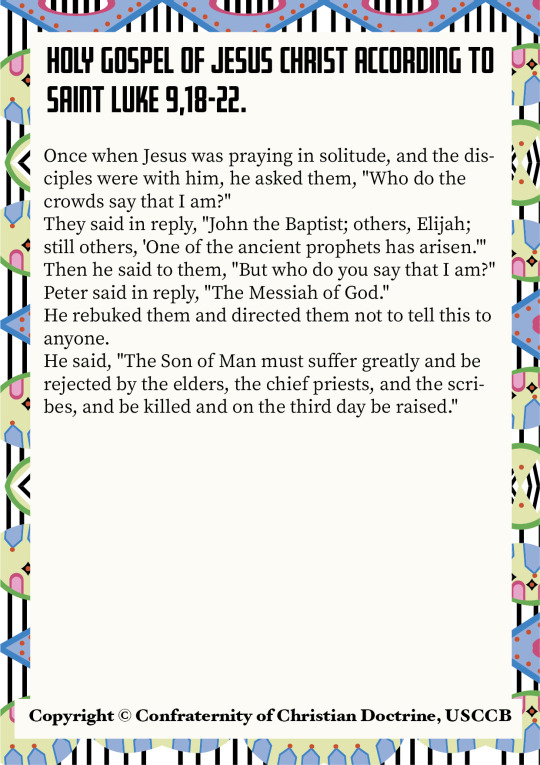

Readings for 23 September
23/09/2022
#Who do you say that I am?#Book of Ecclesiastes 3#Book of Ecclesiastes#Psalms 144(143)#Psalms#Holy Gospel of Jesus Christ according to Saint Luke 9#Holy Gospel of Jesus Christ according to Saint Luke#Saint Teresa of Calcutta (1910-1997)#God#Lord#Jesus#Holy Spirit#love#hope#heaven#life#peace
1 note
·
View note
Photo
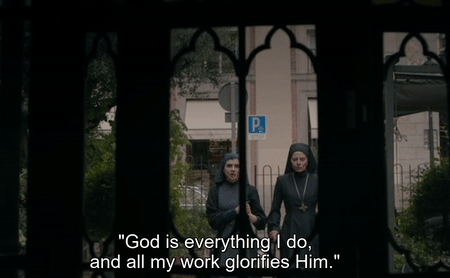

Ecclesiastes?
#warrior nun#avatrice#warrior nun parallels#Beatrice#sister beatrice#sister camila#ava silva#mother superion#Ecclesiastes#Is this book that quotable?
69 notes
·
View notes
Text
When you read the book of Ecclesiastes in the Bible you would probably think the book is pretty depressing right? When you actually find out that the reason whySolomon thought life was meaningless was because he thought there was no afterlife outside of earth. Without Jesus people in the Old Testament thought life was really just a meaningless yolo moment and that makes the book sadder in my opinion. But I’m only on chapter 2 so we’ll see.
#christian faith#christianity#christianblogger#book of ecclesiastes#Solomon#wisest man in the world#life is meaningless
0 notes